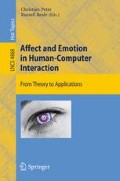Abstract
Computer games are becoming visually realistic, and coupled with more violent storylines and characters there is concern among parents and parts of the media that violent games could encourage aggressive behaviour in those who play them. There have been links made between a number of murders and the violent games played by the murderers. To stimulate other emotions in game players we have developed an emotionally responsive computer game. Based on a traditionally aggressive role-playing environment, we have removed the violent elements and replaced with a goal to navigate obstacles using both positive and negative emotions. Affective cues in the speech of the player are analysed automatically using an emotion recognition system and these affect the physical and behavioural attributes of the gaming character. The character is better able to overcome obstacles based on the emotional state of the player.
Access this chapter
Tax calculation will be finalised at checkout
Purchases are for personal use only
Preview
Unable to display preview. Download preview PDF.
References
Freeman, D.: Creating Emotion in Games. New Riders Publishing (2004)
Cowie, R., et al.: Emotion Recognition in Human-Computer Interaction. IEEE Signal Processing Magazine, 32–80 (January 2001)
Picard, R.W.: Affective Computing. MIT Press, Cambridge (1997)
The Humaine Portal.: Research on Emotion and Human-Machine Interaction (2004), http://www.emotion-research.net/
Banse, R., Scherer, K.R.: Acoustic Profiles in Vocal Emotion Expression. Journal of Personality and Social Psychology 70, 614–636 (1996)
Liberman, M., et al.: Emotional Prosody Speech and Transcripts, Linguistic Data Consortium, Philadelphia (2002)
Author information
Authors and Affiliations
Editor information
Rights and permissions
Copyright information
© 2008 Springer-Verlag Berlin Heidelberg
About this chapter
Cite this chapter
Jones, C., Sutherland, J. (2008). Acoustic Emotion Recognition for Affective Computer Gaming. In: Peter, C., Beale, R. (eds) Affect and Emotion in Human-Computer Interaction. Lecture Notes in Computer Science, vol 4868. Springer, Berlin, Heidelberg. https://doi.org/10.1007/978-3-540-85099-1_18
Download citation
DOI: https://doi.org/10.1007/978-3-540-85099-1_18
Publisher Name: Springer, Berlin, Heidelberg
Print ISBN: 978-3-540-85098-4
Online ISBN: 978-3-540-85099-1
eBook Packages: Computer ScienceComputer Science (R0)

